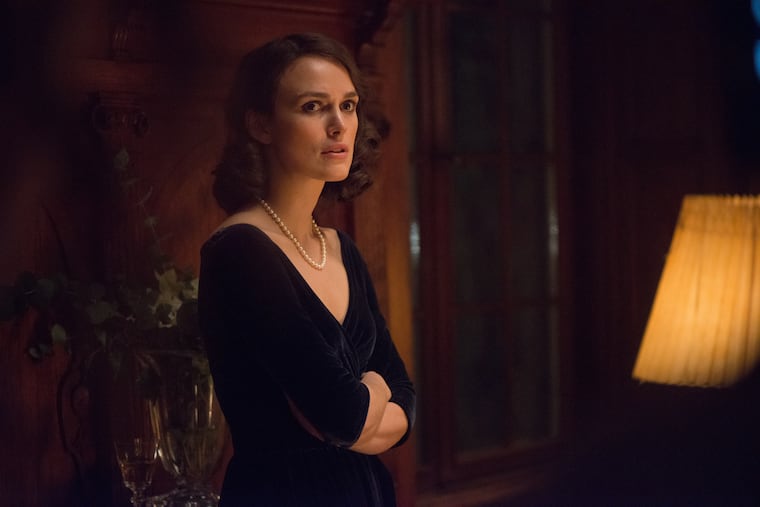Keira Knightley on acting in the 'Aftermath’ of motherhood
Keira Knightley talks about her role in the WWII drama 'The Aftermath.'

As I watched Keira Knightley float through The Aftermath on a cashmere cloud of nice clothes, elegantly attired and showcased in one scene after another, it occurred to me everyone should be photographed like that at least once.
Then I remembered Knightley has already been photographed like that. About half a dozen times, no less, which comes from working with directors like Joe Wright (Pride and Prejudice, Atonement, Anna Karenina).
So it’s a high bar for Knightley, who gets a lot of period roles and wears a lot of awesome period outfits. Even by those standards, she looks swell in The Aftermath, playing a British woman living in the chaos of a surly, defeated Germany just after WWII.
“It’s funny you bring that up, because this is the first time that I worked really closely with the director of photography. Like a real, close collaboration. And I think you see that, where the camera, and what it’s seeing, functions as a character in the film,” Knightley said, referring to her partnership with cinematographer Franz Lustig on The Aftermath, directed by James Kent of Testament of Youth.
Lustig’s camera brings a lush formality to The Aftermath that nods to the classic, high-style movies of the era, and that also feels appropriate to the heightened passions the story invokes.
Knightley plays Rachael, the upper-class wife of a British officer (Jason Clarke) in charge of the Allied force occupying Hamburg just after Germany’s surrender. He oversees the tense, wary peace between the Germans and the British occupiers, and it’s part of his job to hunt down former Nazis trying to blend in with civilians.
Like, maybe, the handsome German architect (Alexander Skarsgård) who is hosting them in his mansion. He’s lost his wife to the war, and Rachael’s lost a son. Their grief eventually becomes the source of mutual understanding, leading to an intimacy that threatens to become perilous.
Knightley is now a mum herself, and I asked her whether being a parent affected the way she played a heartsick mother.
“I think I play everything differently now that I’m a parent,” said Knightley, who is married to musician James Righton. They have a 3-year-old daughter.
“Obviously, it just has a impact on everything, your point of view about everything. Certainly, a woman who doesn’t have a child could play this part, and do a perfectly good job, but I think there are certainly nuances that the experience brings to you that I might not have thought about before I had a kid.”
She uses those nuances in The Aftermath to take the place of the extensive study she ordinarily does in gearing up for a role.
“I’m somebody that likes to do a lot of research, but in this case, I didn’t. I didn’t want to talk to people who’d lost children, I didn’t want to pry into their grief. I didn’t feel comfortable doing that in any way. I read various things. I went online and read very the personal account of a woman who’d lost a child, and she made an interesting observation. We have a word in English for a woman who’s lost a husband, but no word for a parent who’s lost a child. Because it’s too awful to think about, too awful to even name. Suddenly, in place of this thing that was such a huge and central part of your life, now there’s this gaping hole of nothingness.”
This is the first time I’ve interviewed an actor and the phrase “gaping hole of nothingness” has come up, and it doesn’t reflect Knightley’s cheerful mood during our conversation.
But The Aftermath is serious, and Knightley was seriously keen to appear in the movie, adapted from the novel by Rhidian Brook, who based the story loosely on his grandfather’s experiences as an officer in postwar Germany.
She thinks the movie, though rooted in history, speaks to the current state of things. Both in the U.K., where citizens are bitterly divided politically, and in the States, where divisions also abound.
“When I started looking into the history of the Allies in Germany after the war, and how all sides were able to start the process of rebuilding, I wondered, first of all, how the f- did they do that?” Knightley said. “You’ve spent the last six years literally killing each other, and now you are working together to build something. In studying the situation, what I found was that it all starts with everybody learning to see each other as human beings again.”
She doesn’t think the term “greatest generation” is overused.
“The real triumph of that generation is what they did after the war. They were able to achieve the longest period of peace that has ever been known in Europe,” she said. “When you actually think about that, it’s truly heroic.”
I ask Knightley, who’s played a few heroes in her day, what roles she wants her daughter to see.
“Oh, god. I don’t want her to see anything. I’ll be really happy if she reaches age 24 and hasn’t seen a one. My aim is never to show her anything. “
Why?
“I have no idea. I feel a little embarrassed about it, for some reason. I suppose I could stand to show her Pirates of the Caribbean. And I would be happy that she would take some satisfaction in the fact that mommy was really good at fighting pirates."